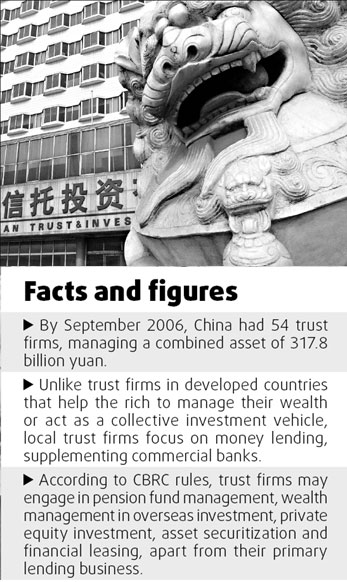Changes in the offing for local trust firms
By Zhang Ran (China Daily )Updated: 2007-05-31 09:23
China's white-hot wealth management market is luring more and more foreign financial firms.
Barclays Bank has been allowed to take a 19.5 percent stake in Chongqing-based Xinhua Trust and Investment Co Ltd, sources close to the trust firm said.
The British bank, together with MBK Partners, a private equity firm set up by Carlyle Group's former Asia head, had originally bid for a 48.64 percent stake by investing 900 million yuan in the Chongqing company.
But the current regulation bars overseas investors from taking more than 25 percent stake in a local financial firm, and Barclays finally had to be content with 19.5 percent for now.
Government sources said the financial regulator is considering allowing
foreign firms to take majority stakes in local trust companies. The buzz is,
overseas investors may be allowed to take a 49 percent, or even higher, stake in
a local trust company soon. 
The purpose of allowing foreign investment in the trust industry, a comparatively quicker step than opening up commercial banks, is to attract foreign strategic investors to help restructure trust firms into professional wealth management institutions. The entry of overseas capital is expected to bring about more restructuring in local trust firms.
Four trust firms - Shaanxi International Trust & Investment Co Ltd, Zhejiang International Trust & Investment Co Ltd, Aijian Trust Co Ltd and Northern International Trust & Investment Co Ltd - have already undergone a round of restructuring.
Hubei International Trust & Investment Co Ltd is introducing strategic investors. Sources in the trust firm said Bank of Communications is likely to take a controlling stake in the firm.
Banks owning trust firms is common in developed countries. As more Chinese commercial banks develop into financial holding companies, analysts point out, more and more trust firms will be taken over by banks, either local or overseas.
"China's trust industry has been a weak link in the financial sector. They are indeed in need of further reforms," said Zhao Xijun, a professor with Renmin University of China.
By September 2006, China had 54 trust firms, managing a combined asset of 317.8 billion yuan - a small part of the total assets of the financial industry.
Many trust firms such as Jinxin Trust & Investment Co Ltd and Jilin Pan Asia Trust & Investment Co Ltd have been stuck in credit crises because of illegal trading and lack of risk management. In March 2006, Jinxin Trust was found guilty of illegally amassing savings and fined 10 million yuan.
Unlike trust firms in developed countries that help the rich to manage their wealth or act as a collective investment vehicle, local trust firms focus on money lending, supplementing commercial banks.
By September 2006, a total of 84.5 billion yuan raised via trust firms was invested in infrastructure, an increase of 101 percent compared with the balance at the beginning of 2006. A total of 46.8 billion yuan was invested in real estate, an increase of 32 percent, while 9.5 billion yuan was invested in securities, an increase of 33 percent.
| |||
Though the Trust Law enacted in October 2001 provided a clearer definition of the term "trust", the industry calls for more regulations.
The CBRC is moving quickly to define the scope of trust companies' investment and depository mandates.
The CBRC introduced two rules in February and April to guide trust firms in developing new businesses. According to these rules, trust firms may engage in pension fund management, wealth management in overseas investment, private equity investment, asset securitization and financial leasing, apart from their primary lending business.
"This will lead to a restructuring of the trust industry. Some poor performers may be kicked out of the business as a result," said an industry insider from Yunnan International Trust & Investment Co Ltd.
(For more biz stories, please visit Industry Updates)
| ||
